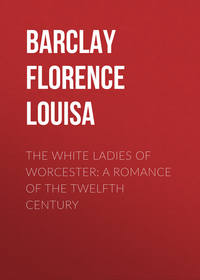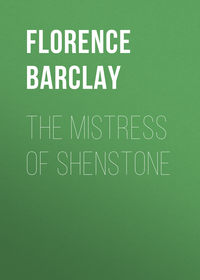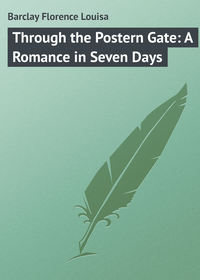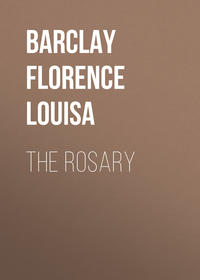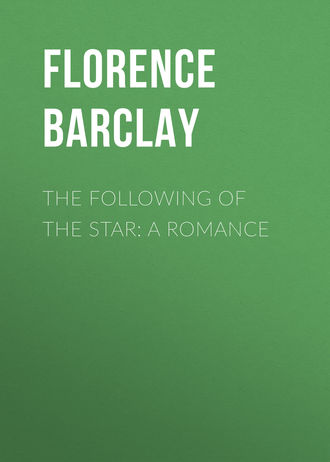 полная версия
полная версияThe Following of the Star: A Romance
He foresaw a beautiful future before her. The very fact that he himself was so soon leaving England, and would have no personal share in that future, made his joy all the purer because of its absolute selflessness. Like the Baptist of old, standing on the banks of Jordan, he had pointed to the passing Christ, saying: "Behold!" She had beheld; she had followed; she had found Him; and the messenger, who had brought about this meeting, might depart. He was needed no longer. The Voice had done its work. All true heralds of the King rejoice when the souls they have striven to win turn and say: "Now we believe, not because of thy saying; for we have heard Him ourselves, and know that this is indeed the Christ, the Saviour of the world." This test was now David's; and being a true herald, he did not fail before it.
When Diana had risen from her knees, she had turned to him and said, gently: "Cousin David, do you mind if I order the motor now? I could not speak or think to-night of other things; and I just feel I want to be alone."
During the few moments which intervened before the car was announced, they sat in silence, one on either side of the fireplace. There was a radiance of joy on both young faces, which anyone, entering unexpectedly, would doubtless have put down to a very different cause. Diana was not thinking at all of David; and David was thinking less of Diana than of the Lord Whose presence with them, in that evening hour, had made of it a time of healing and of power.
As he rose to go, she put her hand in his.
"Cousin David," she said, "more than ever now, I need your counsel and your help. If I send over, just before one o'clock, can you come to luncheon to-morrow, and afterwards we might have the talk which I cannot manage to-night?"
David agreed. The weddings at which he had to officiate were at eleven o'clock. "I will be ready," he said, "and I will come. I am afraid my advice is not worth much; but, such as it is, it is altogether at your service."
"Good-night, Cousin David," she said, "and God bless you! Doesn't it say somewhere in the Bible: 'They that turn many to righteousness shall shine as the stars for ever and ever'?"
David now remembered this farewell remark of Diana's, as he stood for a moment at the Rectory gate, looking upward to the clear frosty sky. But the idea did not suit his mood.
"Ah, no, my Lord," he said. "Thou art the bright and morning Star. Why should I want, for myself, any glory or shining? I am content forever to be but a follower of the Star."
CHAPTER IX
Uncle Falcon's Will
Luncheon would have been an awkward affair, owing to David's nervous awe of Mrs. Marmaduke Vane and his extreme trepidation in her presence, had it not been for Diana's tact and vivacity.
She took the bull by the horns, explaining David's mistake, and how it was entirely her own fault for being so ambiguous and inconsequent in her speech – "as you have told me from my infancy, dear Chappie"; and she laughed so infectiously over the misunderstanding and over the picture she drew of poor David's dismay and horror, that Mrs. Marmaduke Vane laughed also, and forgave David.
"And to add to poor Cousin David's confusion, he had made sure, at first sight, that you were at least a duchess," added Diana tactfully; "and they don't have them in Central Africa; so Cousin David felt very shy. Didn't you, Cousin David?"
David admitted that he did; and Mrs. Vane began to like "Diana's missionary."
"I have often noticed," pursued Miss Rivers, "that the very people who are the most brazen in the pulpit, who lean over the side and read your thoughts; who make you lift your unwilling eyes to theirs, responsive; who direct the flow of their eloquence full upon any unfortunate person who is venturing at all obviously to disagree – are the very people who are most apt to be shy in private life. You should see my Cousin David fling challenge and proof positive at a narrow-minded lady, with an indignant rustle, and a red feather in her bonnet. I believe her husband is a tenant-farmer of mine. I intend to call, in order to discuss Cousin David's sermons with her. I shall insist upon her showing me the passage in her Bible where it says that there were three Wise Men."
Then Diana drew David on to tell of his African congregations, of the weird experiences in those wild regions; of the perils of the jungle, and the deep mystery of the forest. And he made it all sound so fascinating and delightful, that Mrs. Marmaduke Vane became quite expansive, announcing, as she helped herself liberally to pâté-de-foie-gras, that she did not wonder people enjoyed being missionaries.
"You should volunteer, Chappie dear," said Diana. "I daresay the society sends out ladies. Only – fancy, if you came back as thin as Cousin David!"
In the drawing-room, she sent him to the piano; and Mrs. Vane allowed her coffee to grow cold while she listened to David's music, and did not ask Diana to send for more, until David left the music stool.
Then Diana reminded her chaperon of an engagement she had at Eversleigh. "The motor is ordered at half-past two, dear; and be sure you stay to tea. Never mind if they don't ask you. Just remain until tea appears. They can but say: 'Must you stay? Can't you go?' And they won't do that, because they are inordinately proud of your presence in their abode."
Mrs. Vane rose reluctantly, expressing regret that she had unwittingly made this engagement, and murmuring something about an easy postponement by telegram.
But Diana was firm. Such a disappointment must not be inflicted upon any family on Boxing-day. It could not be contemplated for a moment.
Mrs. Marmaduke Vane took David's hand in both her plump ones, and patted it, kindly.
"Good-bye, my dear Mr. Rivers," she said with empressement. "And I hope you will have a quite delightful time in Central Africa. And mind," she added archly, "if Diana decides to come out and see you there, I shall accompany her."
Honest dismay leapt into David's eyes.
"It is no place for women," he said, helplessly. Then looked at Diana. "I assure you, Miss Rivers, it is no place for women."
"Never fear, Cousin David," laughed Diana. "You have fired Mrs. Vane with a desire to rough it; but I do not share her ardour, and she could not start without me. Could you, Chappie dear? Good-bye. Have a good time."
She turned to the fire, with an air of dismissal, and pushed a log into place with her toe.
David opened the door, waited patiently while Mrs. Vane hoarsely whispered final farewell pleasantries; then closed it behind her portly back.
When he returned to the hearthrug, Diana was still standing gazing thoughtfully into the fire, one arm on the mantel-piece.
"Oh, the irony of it!" she said, without looking up. "She hopes you will have a quite delightful time; and, as a matter of fact, you are going out to die! Cousin David, do you really expect never to return?"
"In all probability," said David, "I shall never see England again. They tell me I cannot possibly live through another five years out there. They think two, or at most three, will see me through. Who can tell? I shall be grateful for three."
"Do you consider it right, deliberately to sacrifice a young life, and a useful life, by returning to a place which you know must cost that life? Why not seek another sphere?"
"Because," said David, quietly, "my call is there. Some one must go; and who better than one who has absolutely no home-ties; none to miss or mourn him, but the people for whom he gives his life? It is all I have to give. I give it gladly."
"Let us sit down," said Diana, "just as we sat last night, in those quiet moments before the motor came round. Only now, I can talk – and, oh, Cousin David, I have so much to say! But first I want you to tell me, if you will, all about yourself. Begin at the beginning. Never mind how long it takes. We have the whole afternoon before us, unless you have anything to take you away early."
She motioned him to an easy chair, and herself sat on the couch, leaning forward in her favourite attitude, her elbow on her knee, her chin resting in the palm of her hand. Her grey eyes searched his face. The firelight played on her soft hair.
"Begin at the beginning, Cousin David," she said.
"There is not much to tell of my beginnings," said David, simply. "My parents married late in life. I was their only child – the son of their old age. My home was always a little heaven upon earth. They were not well off; we only had what my father earned by his practice, and village people are apt to be slack about paying a doctor's bills. But they made great efforts to give me the best possible education; and, a generous friend coming to their assistance, I was able to go to Oxford." His eyes glowed. "I wish you could know all that that means," he said; "being able to go to Oxford."
"I can imagine what it would mean – to you," said Diana.
"While I was at Oxford, I decided to be ordained; and, almost immediately after that decision, the call came. I held a London curacy for one year, but, as soon as I was priested, by special leave from my Bishop, and arrangement with my Vicar, I went out to Africa. During the year I was working in London, I lost both my father and my mother."
"Ah, poor boy!" murmured Diana. "Then you had no one."
David hesitated. "There was Amy," he said.
Diana's eyelids flickered. "Oh, there was 'Amy.' That might mean a good deal. Did 'Amy' want to go out to Central Africa?"
"No," said David; "nor would I have dreamed of taking her there. Amy and I had lived in the same village all our lives. We had been babies together. Our mothers had wheeled us out in a double pram. We were just brother and sister, until I went to college; and then we thought we were going to be – more. But, when the call came, I knew it must mean celibacy. No man could take a woman to such places. I knew, if I accepted, I must give up Amy. I dreaded telling her. But, when at last I plucked up courage and told her, Amy did not mind very much, because a gentleman-farmer in the neighbourhood was wanting to marry her. Amy was very pretty. They were married just before I sailed. Amy wanted me to marry them. But I could not do that."
Diana looked at the thin sensitive face.
"No," she said; "you could not do that."
"I thought it best not to correspond during the five years," continued David, "considering what we had been to one another. But when I was invalided home, I looked forward, in the eager sort of way you do when you are very weak, to seeing Amy again. I had no one else. As soon as I could manage the journey, I went down – home; and – and called at Amy's house. I asked for Mrs. Robert Carsdale – Amy's married name. A very masculine noisy lady, whom I had never seen before, walked into the room where I stood awaiting Amy. She had just come in from hunting, and flicked her boot with her hunting-crop as she asked me what I wanted. I said: "I have called to see Mrs. Robert Carsdale." She said: "Well? I am Mrs. Robert Carsdale," and stared at me, in astonishment.
"So I asked for Amy. She told me where to – to find Amy, and opened the hall door. Amy had been dead three years. Robert Carsdale had married again. I found Amy's grave, in our little churchyard, quite near my own parents'. Also the grave of her baby boy. It was all that was left of Amy; and, do you know, she had named her little son 'David.'"
"Oh, you poor boy!" said Diana. "You poor, poor boy! But, do you know, I think Amy in heaven was better for you, than Amy on earth. I don't hold with marriage. Had you cared very much?"
"Yes, I had cared a good deal," replied David, in a low voice; "but as a boy cares, I think. Not as I should imagine a man would care. A man who really cared could not have left her to another man, could he?"
"I don't hold with matrimony," said Diana again; and she said it with forceful emphasis.
"Nor do I," said David; "and my people out in Africa are all the family I shall ever know. I faced that out, when I accepted the call. No man has a right to allow a woman to face nameless horrors and hardships, or to make a home in a climate where little children cannot live."
"Ah, I do so agree with you!" cried Diana. "I once attended a missionary meeting where a returned missionary from India told us how she and her husband had had to send their little daughter home to England when she was seven years old, and had not seen her again until she was sixteen. 'When we returned to England,' she told the meeting, 'I should not have known my daughter had I passed her in the street!' And every one thought it so pathetic, and so devoted. But it seemed to me false pathos, and unpardonable neglect of primary duties. Who could take that mother's place to that little child of seven years old? And, from the age of seven to sixteen, how a girl needs her own mother. What call could come before that first call – her own little child's need of her? And what do you think that missionary-lady's work had been? Managing a school for heathen children! All the time she was giving an account of these children of other people and her work among them, I felt like calling out: 'How about your own?' Cousin David, I didn't put a halfpenny in the plate; and I have hated missionaries ever since!"
"That is not quite just," said David. "But I do most certainly agree with you, that first claims should come first. And therefore, a man who feels called to labour where wife and children could not live, must forego these tender ties, and consider himself pledged to celibacy."
"It is the better part," said Diana.
David made no answer. It had not struck him in that light before. He had always thought he was foregoing an unknown but an undoubted joy.
A silence fell between them. He was pondering her last remark; she was considering him, and trying to fathom how much sincerity of conviction, strength of will, and tenacity of purpose, lay behind that gentle manner, and straightforward simplicity of character.
Diana was a fearless cross-country rider. She never funked a fence, nor walked a disappointed horse along, in search of a gap or a gate. But before taking a high jump she liked to know what was on the other side. So, while David pondered Diana's last remark, Diana studied David.
At length she said: "Do you remember my first appearance at Brambledene church, on a Sunday evening, about five weeks ago?"
Yes; David remembered.
"I arrived late," said Diana. "I walked up the church to blasts of psalmody from that noisy choir."
David smiled. "You were never late again," he said.
"Mercy, no!" laughed Diana. "You gave one the impression of being the sort of person who might hold up the entire service, while one unfortunate late-comer hurried abashed into her pew. Are many parsons so acutely conscious of the exact deportment of each member of their congregations?"
"I don't know," answered David. "I suppose the keen look-out one has to keep for unexpected and sometimes dangerous happenings, at all gatherings of our poor wild people, has trained one to it. I admit, I would sooner see the glitter of an African spear poised in my direction from behind a tree trunk, than see Mrs. Smith nudge her husband, in obvious disagreement with the most important point in my sermon."
"Well," continued Diana, "I came. And what do you think brought me?"
David had no suggestion to make as to what had brought Diana.
"Why, after you had come down for an interview with my god-father and spent a night at the Rectory, I motored over to see him, just before he went for his cure. He told me all about you; and, among other things, that you were going back knowing that the climate out there could only mean for you a very few years of life; and I came to church because I wanted to see a man whose religion meant more to him than even life itself – I, who rated life and health as highest of all good; most valuable of all possessions.
"I came to see– wondering, doubting, incredulous. I stayed to listen– troubled, conscience-stricken, perplexed. First, I believed in you, Cousin David. Then I saw the Christ-life in you. Then I longed to have what you had – to find Him myself. Yesterday, He found me. To-day, I can humbly, trustfully say: 'I know Whom I have believed, and am persuaded that He is able to keep that which I have committed unto Him against that day.' I am far from being what I ought to be; my life just now is one tangle of perplexities; but the darkness is over, and the true light now shineth. I hope, from this time onward, to be a follower of the Star."
"I thank God," said David Rivers.
"And now," continued Diana, after a few moments of happy silence, "I am going to burden you, Cousin David, with a recital of my difficulties; and I am going to ask your advice. Let me tell you my past history, as shortly as possible.
"This dear old place is my childhood's home. My earliest recollection is of living here with my mother and my grandfather. My father, Captain Rivers, who was heir to the whole property, died when I was three years old. I barely remember him. The property was entailed on male heirs, and failing my father, it came to a younger brother of my grandfather, a great-uncle of mine, a certain Falcon Rivers, who had fallen out with most of his relations, gone to live in America, and made a large fortune out there. My grandfather and my mother never spoke of Uncle Falcon, and I remember, as a child, having the instinctive feeling that even to think of Uncle Falcon was an insidious form of sin. It therefore had its attractions. I quite often thought of Uncle Falcon!
"Toward the close of his life, my grandfather became involved in money difficulties. Much of the estate was mortgaged. I was too young and heedless to understand details, but it all resulted in this: that when my grandfather died, he was unable to leave much provision for my mother, or for me. We had to turn out of Riverscourt; Uncle Falcon was returning to take possession. So we went to live in town, on the merest pittance, and in what, after the luxuries to which I had always been accustomed, appeared to me abject poverty. I was then nineteen. My mother, who had been older than my father, was over fifty.
"Then followed two very hard years. Uncle Falcon wrote to my mother; but she refused to see him, or to have any communication with him. She would not show me his letter. We were absolutely cut off from the old home, and all our former surroundings. Once or twice we heard, in roundabout ways, how much Uncle Falcon's wealth was doing for the old place. Mortgages were all paid off; tumbled-down cottages were being rebuilt; the farms were put into proper order, and let to good tenants. American money has a way of being useful, even in proud old England.
"Any mention of all this, filled my mother with an extreme bitterness, to which I had not then the key, and which I completely failed to understand.
"One morning, at breakfast, she received an envelope, merely containing a thin slip of paper. Her beautiful face – my mother was a very lovely woman – went, as they say in story-books, whiter than the table-cloth. She tore the paper across, and across again, and flung the fragments into the fire. They missed the flames, and fluttered down into the fender. I picked them up, and, right before her, pieced them together. It was a cheque from Uncle Falcon for a thousand pounds. 'Oh, Mamma dear!' I said. I was so tired of running after omnibuses, and pretending we liked potted meat lunches.
"She snatched the fragments out of my fingers, and dropped them into the heart of the fire.
"'Anyway, it was kind of Uncle Falcon,' I said.
"'Do not mention his name,' cried my mother, with white lips; and I experienced once more the fascination of the belief, which had been mine in childhood, that Uncle Falcon, and the Prince of Darkness, were somehow akin.
"To cut a long story short, at the end of those two hard years, my mother died. A close friend of ours was matron in the Hospital of the Holy Star – ah, yes, how curious! I had forgotten the name – a beautiful little hospital in the Euston Road, supported by private contributions. She accepted me for training. I found the work interesting, and soon got on. You may have difficulty in believing it, Cousin David, but I make a quite excellent nurse. I studied every branch, passed various exams., looked quite professional in my uniform, and should have been a ward Sister before long – when the letter came, which again changed my whole life.
"It was from Uncle Falcon! He had kept himself informed of my movements through our old family lawyer, Mr. Inglestry, who, during those years, had never lost sight of poor mamma, nor of me. I can remember Uncle Falcon's letter, word for word.
"'My Dear Niece,' he wrote, 'I am told you are by now a duly qualified hospital nurse. My body is in excellent health, but my brain – which I suppose I have worked pretty strenuously – has partially given way; with the result that my otherwise healthy body is more or less helpless on the right side. My doctor tells me I must have a trained nurse; not in constant attendance – Heaven protect the poor woman, if that were necessary! – but somewhere handy in the house, in case of need.
"'Now why should I be tended in my declining years, by a stranger, when my own kith and kin is competent to do it? And why should I bring a stray young woman to this beautiful place, when the girl whose rightful home it is, might feel inclined to return to it?
"'I hear from old What's-his-name, that you bear no resemblance whatever to your father, but are the image of what your mother was, at your age. That being the case, if you like to come home, my child, I will make your life as pleasant as I can, for her sake.
"'Your affectionate unknown uncle,"'Falcon Rivers.'"Well – I went.
"I arrived in uniform, not sure what my standing was to be in the house, but thankful to be back there, on any terms, and irresistibly attracted by the spell of Uncle Falcon.
"Our own old butler opened the door to me. I nearly fell upon his neck. The housekeeper, who had known me from infancy, took me up to my room. They wept and laughed, and seemed to look upon my uniform as one of Miss Diana's pranks – half funny, half naughty. Truth to tell, I did feel dressed up, when I found myself inside the old hall again.
"In twenty-four hours, Cousin David, I was installed as the daughter of the house.
"Of Uncle Falcon's remarkable personality, there is not time to tell you now. We took to each other at once, and, before long, he felt it right to put away, at my request, the one possible cause of misunderstanding there might have been between us, by telling me the true reason of his alienation from home, and his breach with my grandfather and my parents.
"Uncle Falcon was ten years younger than my grandfather. My mother, then a very lovely woman, in the perfection of her beauty, was ten years older than my father, a young subaltern just entering the army. My mother was engaged to Uncle Falcon, who loved her with an intensity of devotion, such as only a nature strong, fiery, rugged as his, could bestow.
"During a visit to Riverscourt, shortly before the time appointed for her marriage to Uncle Falcon, then a comparatively poor man with no prospects – my mother met my father. My father fell in love with her, and my mother jilted Uncle Falcon in order to marry the young heir to the house and lands of Riverscourt. Poor mamma! How well I could understand it, remembering her love of luxury, and of all those things which go with an old country place and large estates. Uncle Falcon never spoke to her again, after receiving the letter in which she put an end to their engagement; but he had a furious scene with my grandfather, who had connived at the treachery toward his younger brother; and then horsewhipped the young subaltern, in his father's presence.
"Shortly afterwards, he sailed for America, and never returned.
"Then – oh, irony of fate! After three years of married life, the young heir died, without a son, and Uncle Falcon stood to inherit Riverscourt, as the last in the entail.
"Meanwhile everything he touched had turned to gold, and he only waited my grandfather's decease to return as master to the old home, with the large fortune which would soon restore it to its pristine beauty and grandeur.


